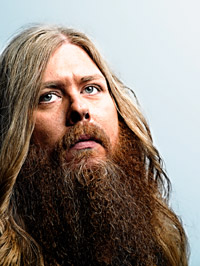If you were driving south on Interstate 277 past Charlotte, North Carolina, and pulled off at exit 3A for gas, you might see a man with waist-length red hair and a bushy beard pull up in a 1985 Dodge truck. Shirtless, with a big, pale belly and blue jeans barely clinging to his waist. You’d think mountain man, Gregg Allman’s cousin, meth head—redneck. You might even be frightened.
Beyond any highway exit, inside the secluded neighborhoods full of strangers watching TV, among the strip-mall drive-thrus that echo with the foreign tongues of local teens, are secret worlds that can’t easily be deciphered. And so it is with Charlotte: for behind the forest of hair and the imposing physique of your gas-station redneck is one of the best pop songwriters in America, a musical autodidact and a heavy-hearted leonine balladeer whose confessions from the world off 277 will break your heart.
I could be the bachelor in your parlor
You could be the fingers in my hair
I could end up losing all my money playing cards
You could end up winning all my money playing cards
And being in love with me.
(“So Much Better”)
Last year, thirty-three-year-old Benji Hughes came out with his first solo record, A Love Extreme, a double album filled with lavish pop come-ons, crackling dance beats, moody soundscapes, and transcendent piano ballads. You can hear the influences of Randy Newman, Prince, the Carpenters, and Pavement, all filtered through Benji’s deep nasal drawl, a voice of casual vulnerability. In blog-like minutiae his songs tell of one man’s life as a hopeless romantic in a faceless American city known primarily as the headquarters of bailed-out banks like Wachovia and Bank of America.
Singing about his gang of “Charlotte people” going to see the Flaming Lips in nearby Asheville one weekend (in a song called “I Went with Some Friends to See the Flaming Lips”), he turns a garden-variety anecdote you might overhear at a coffee shop into a tender diary entry set to bouncy, eager-to-please pop:
I went with some friends to see the Flaming Lips
It was the greatest show I ever saw
We’d been planning the trip for a couple of months
And I just couldn’t wait to get it on
It was April seventeenth
It was a Thursday night
It was raining just a little but we didn’t mind
We had some drinks in the bar at the Haywood Park
Sent Mark and Jason on a beer run, ’cause it was getting dark
Then we checked into our rooms and started eating mushrooms
Jessica and Elle dropped by
...
You have reached your article limit
Sign up for a digital subscription and continue reading all new issues, plus our entire archives, for just $1.50/month.
Already a subscriber? Sign in





